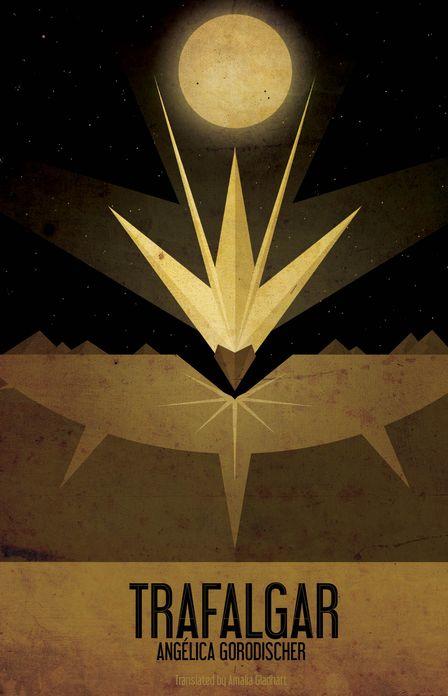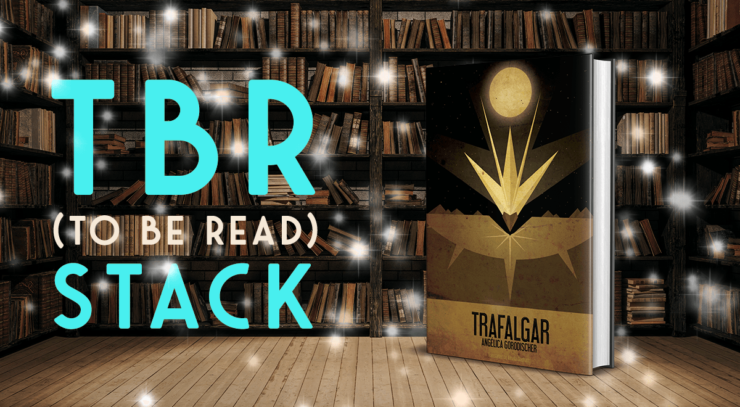I’ve had Trafalgar on my TBR stack for years now—I think I bought it from Small Beer Press’ table at a long-ago AWP Book Fair? I was saddened to see the news of Angélica Gorodischer’s passing last month, and decided to move the book up to the top. It’s delightful, and I regret all of the years I spent not reading Gorodischer!
For those who haven’t read it: Trafalgar is a collection of linked stories, all focused on a man named Trafalgar Medrano, the son of a highly respected doctor/notable citizen of Rosario, Argentina. When we meet him he is living a life of confirmed bachelorhood, after the tragic death of his parents, living in the house he grew up in, and attended by the pair of servants who have been with him his entire life. Rather than going into medicine like his father, he runs a fabulously successful import/export business, and is often out of town for work—when he’s home, you can usually find him in a cafe or club with his friends. The structure of most of the collection’s stories is thus: Trafalgar sits down with a friend or friends and, over several liters of coffee, talks about his latest business trips, with occasional interruptions from the friends. Most of the stories end up feeling like you’re one of the friends at the table, or that you’re a friend-of-a-friend, hearing about Trafalgar’s adventures secondhand from one of his intimates.
This might sound like it wouldn’t be terribly involving, or that the returns might diminish, but instead each successive story becomes more interesting than the last. (A note at the opening of the book, from Gorodischer [whom I’m assuming is often the friend recounting Trafalgar’s adventures to you, the reader] asks you to read the stories in book order rather than skipping around.) And as for why secondhand accounts of business trips are specfic—Trafalgar’s adventures usually consist of traveling to far away planets to sell stuff to aliens. Occasionally, Trafalgar travels through time in something other than the usual linear fashion, or learns something incredibly profound about the inner workings of the universe. (Or, multiverse? It’s unclear.) He travels to a new planet, sells some stuff, gets into a mishap, comes home to tell the tale. And even though no other Rosarians seem to travel through space, everyone accepts his stories as fact.
Over the course of the book Trafalgar visits: an alternate 15th Century Spain where he has to convince the Inquisition that he’s not, in fact, in league with the Evil One; a planet where multiple times happen simultaneously, e.g. you wake up one day and you’re in a charming port city that’s more or less at the same “time” as your home back on Earth, but when you wake the next day you’re in a forest thousands of years earlier; a planet where the dead don’t stay dead, and refuse to allow the living any tech advancements (or, really joy) because they’re jealous; a planet where people spent eons living underground in caves hiding from an over-strong sun, and, having at last manufactured heat shields, now treat life as an endless party to make up for the Cave Times; a planet with a rigid, unforgiving caste system (which he tries, haphazardly, to upend); and a planet run by a strict matriarchy whose use of tech leads to a, ummm, dicey bedroom scenario.
Buy the Book


Trafalgar
The reason the book works, though, is the tone. At all times, no matter the situation, the tone is light, wry, deadpan. Trafalgar might as well be telling his friends about a trip to Milan or Houston, Texas. He interrupts himself frequently to attend to his ubiquitous coffee, and lunches and dinners re planned in parenthetical statements between firefights and hair-raising escapes. In writing classes, you’ll hear a lot about the importance of finding a story’s energy, of deciding where to place your focus. What aspects of a story deserve the most time on the page? In a novel, you have room, you can stretch out and describe landscapes and genealogies and generations-long family feuds. But in a short story you need to keep your focus a lot tighter to keep your reader engaged. Here, no matter what the plot is, Gorordischer gives time over to Trafalgar’s true concerns: what the aliens fed him and whether their coffee passed muster.
In each story, when Trafalgar gets around to talking about alien anthropology or the nature of the space-time continuum, those details are fascinating and intricate and leave you wanting whole books set on each planet. BUT. All that wonkiness has its place, and that place is after we know whether Trafalgar is hungry or in need of caffeine or nicotine.
What this reminded me of, and one of the reasons I loved it so much, was that this book felt like wry, adult Daniel Pinkwater. Trafalgar felt to me like Borgel’s Argentinean cousin who only blew through town for a weekend once every 15 years or so, even down to referring to his vehicle, which has to be some sort of spaceship, solely as the “clunker” which reminded me of nothing so much as Borgel’s ancient, discontinued Dorbzeldge. Reading Gorodischer has that similar feeling of being welcomed into someone home and plied with stories and food. But to be clear it isn’t just that—what worked best for me was that the focus on quotidian details make the serious moments land with a surprising weight.
For one example (and spoilers for one of the stories here, duck out if you want to go into the book completely cold), in “Trafalgar and Josefina”, we learn that Trafalgar has visited a planet with an extremely hierarchical structure that exploits the lower classes, and renders a large part of the population homeless and without any prospects for the future. There is simply no way for them to escape the caste system. But the way we’re introduced to this society is via the narrator’s elderly, very proper Aunt Josefina, who has recently spent an enjoyable afternoon teatime with Trafalgar himself. As the Aunt relates the tale to her niece, it becomes clear that this society is horrific. But Josefina, who believes in authority and order, trusts the upper classes and agrees that the riffraff at the other end of the system need to be managed for their own good. Moreover, she clearly thinks that Trafalgar, as a man of taste and breeding, agrees with her, and has told her a story about an unfortunate cross-caste romance that needed to be suppressed—rather than the failed attempt at revolution he’s actually describing. Josefina’s niece sees that Trafalgar was trying to subvert the caste system, but when she tries to point this out to her aunt, the older woman puts it down to her being too modern, because what else can you expect from a girl who wears slacks?
It’s a fascinating way to tell this story. Rather than seeing the perspective of the oppressed revolutionaries, or the upper class who are trying to hold onto the status quo, we get a rich woman blind to the fact that she’s siding with evil, who assumes that everyone around her agrees with her. And when someone doesn’t agree, they’re simply dismissed as silly, not even important enough to be argued with. This angle makes the actual plot of the near-uprising even more tragic and upsetting—in the version of the story where I follow a tragic revolutionary to their doom I can steel myself against my outrage, but hearing the story third-hand from a callous, sniffy aunt who’s more concerned with her tea than justice hit me much harder than I expected. The fact that the story still holds to the banal structure of a few people sitting down for a casual drink only serves to amplify the horror.
Now again, most of the stories in the collection are far lighter and more fun than “Trafalgar and Josefina”. But I was also impressed with the way Gorodischer wove thought experiments and worldbuilding into the book around the characters. By the time we get to the moment when Trafalgar gives his friend a travel tip: “When you go to a place of which you know nothing and no one, you have to seek out three things: bookstores, temples, and brothels” we’ve already seen how this businessman seeks out cultures that prioritize art, music, and joy—or at least those are the cultures he chooses to talk about with his friends back home. And as the book rolls along there is a definite shift in tone, as we see Trafalgar trying, in ways both subtle and not, to nudge cultures that are either too oppressive or too orderly in more chaotic directions. Or, to use Trafalgar’s own words:
“…when a whole city and all of the cities and everything is like an enormous and efficient company presided over by a narrow gauge logic where the effects always follow the causes and the causes march along single file and the dodo birds don’t worry about anything nor are they surprised by anything and they slither along beside you faintly pleased, I—like any normal person—feel a great desire to kill someone or commit suicide.”
I think “Trafalgar and Josefina” stands out to me so much because it’s one of the rare stories in the collection where charm simply can’t win the day. “Mr. Chaos” is another, and “Strelitzias, Lagerstroemias, and Gypsophila”—occasionally Trafalgar runs into societies that won’t allow for nonsense or romance, or that literally eat their culture in a way that can’t help but destroy any shot at a future. “The Best Day of the Year” takes a fun question about the passage of time and turns it into a portrait of a culture in four acts. “The Gonzalez Family’s Fight for a Better World” takes a question about death and buries a poignant truth about the need for change inside a long, drawn out practical joke.
Gorodischer uses a storytelling style that could have been limiting, and instead creates a book that feels like sitting around a campfire with friends; she takes a collection of serious topics, and makes them fun as hell.
Leah Schnelbach wants to get coffee with Trafalgar, though he’ll probably be horrified by the amount of sugar involved. Come join them in the malevolent thought experiment that is Twitter!










